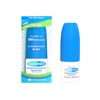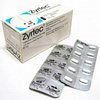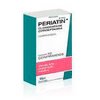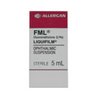INDICATIONS
Benadryl is used for preventing or treating symptoms of hay fever and other upper respiratory allergies or the common cold, such as runny nose, sneezing, itching of the nose and throat, and itchy, watery eyes, and relieving cough.
INSTRUCTIONS
Do not take Benadryl if you have taken a monoamine oxidase inhibitor (MAOI) such as isocarboxazid (Marplan), phenelzine (Nardil), or tranylcypromine (Parnate) in the last 14 days. A very dangerous drug interaction could occur, leading to serious side effects.
Before taking Benadryl, tell your doctor if you have:
- glaucoma or increased pressure in the eye;
- a stomach ulcer;
- an enlarged prostate, bladder problems or difficulty urinating;
- an overactive thyroid (hyperthyroidism);
- hypertension or any type of heart problems; or
- asthma.
You may not be able to take Benadryl, or you may require a lower dose or special monitoring during treatment if you have any of the conditions listed above.
Take Benadryl exactly as directed on the package or as directed by your doctor. If you do not understand these directions, ask your pharmacist, nurse, or doctor to explain them to you.
Take each dose with a full glass of water.
Benadryl can be taken with or without food.
For motion sickness, a dose is usually taken 30 minutes before motion, then with meals and at bedtime for the duration of exposure.
As a sleep aid, Benadryl should be taken approximately 30 minutes before bedtime.
To ensure that you get a correct dose, measure the liquid forms of Benadryl with a special dose-measuring spoon or cup, not with a regular tablespoon. If you do not have a dose-measuring device, ask your pharmacist where you can get one.
Never take more of Benadryl than is prescribed for you. The maximum amount of diphenhydramine that you should take in any 24-hour period is 300 mg.
Take the missed dose as soon as you remember. However, if it is almost time for the next dose, skip the missed dose and take only the next regularly scheduled dose. Do not take a double dose of Benadryl unless otherwise directed by your doctor.
DOSAGE
Do NOT use more than directed.
Adults and children 12 years of age and over - 25 mg to 50 mg (1 to 2 capsules).
Children 6 to under 12 years of age - 12.5 mg ** to 25 mg (1 capsule).
Children under 6 years of age - consult a doctor.
STORAGE
Store Benadryl at room temperature between 68 and 77 degrees F (20 and 25 degrees C) in a tightly closed container. Brief periods at temperatures of 59 to 86 degrees F (15 to 30 degrees C) are permitted. Store away from heat, moisture, and light. Do not store in the bathroom. Keep Benadryl out of the reach of children and away from pets.







